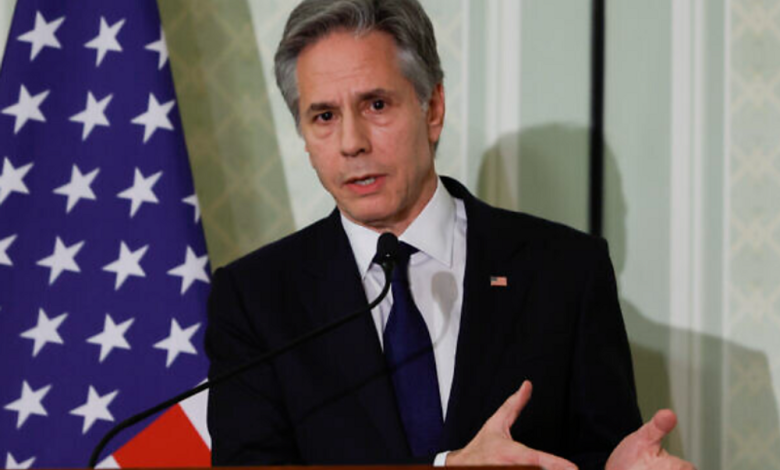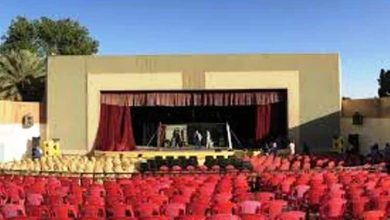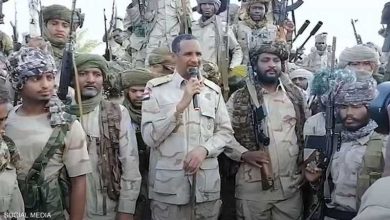Reports
At a Security Council session chaired by Blinken… Awaiting a decisive stance on militia violations

Sudan Events – Agencies
U.S. Secretary of State Antony Blinken will head to New York City (Wednesday) to chair two United Nations Security Council meetings, today and tomorrow, as the United States holds the rotating presidency of the Council for the month of December.
The first meeting will focus on the implications of artificial intelligence for maintaining international peace and security, while the second session will address Sudan and the ongoing humanitarian crisis there.
While the U.S. Secretary of State might not be overly concerned with what the Sudanese Armed Forces or the Sudanese government say about the atrocities committed by the Rapid Support Forces (RSF) militia against Sudanese civilians—on the grounds that the Sudanese government and military are “parties to the conflict” and have a vested interest in discrediting the rebellious RSF—what about what American institutions, which operate under the same umbrella as Blinken and his government, have to say? And what about respected American academic institutions? What about British-American organizations?
It is worth noting that the Security Council session to be chaired by Blinken on Thursday, regarding Sudan, takes place at a time when respected American institutes are piling up condemnations related to the ongoing war in Sudan and the crimes—according to American institutions—committed by the RSF militia and its allied groups, in Sudan in general and Darfur in particular, with enough evidence to support these claims.
Yale University Research Institute Report
The United Nations Security Council has had a resolution since 2005 that prohibits the transfer of weapons that could prolong the war in Darfur. Reports from the United Nations Expert Committee on this matter have been accumulating since the early months of the war, providing documented evidence of increased weapon flows into Darfur from several neighboring countries, primarily Chad. These reports also highlight the parties involved in shipping and receiving these weapons and their use in the conflict.
However, the revelation about the flow of weapons and their types has not been limited to the United Nations Expert Committee or international investigative journalism, like that of The New York Times, but has extended to scientific institutes in prestigious American universities that focus on humanitarian issues. Recently, a respected research institution in the United States released an extensive academic report stating that the indiscriminate heavy shelling of civilian areas carried out by the RSF against Al-Fashir and Zamzam led to the death of many and forced a large number of displaced people to flee, facing possibly even worse fates.
According to the report published by the Humanitarian Research Lab at Yale University on December 13, 2024, the weapons used in shelling civilian areas were imported by the United Arab Emirates and used by the RSF against civilian sites in Al-Fashir and displaced persons’ camps in Zamzam.
The esteemed institute traced these weapons and said they were specifically owned by two countries: China, the producer, and the United Arab Emirates, the sole buyer in the region.
The report states that, surprisingly, large artillery guns known as AH4 Howitzers, with a caliber of 155mm (which military experts know are highly dangerous and lethal), appeared in the hands of the RSF militias in the mountains overlooking Al-Fashir and Zamzam camps. The report confirms that they were used against displaced civilians in Zamzam camps and caused the deaths, destruction, and displacement of thousands of civilians.
So, will the U.S. Secretary of State take this into consideration, or should Sudan’s representative at the United Nations draw his attention to this product made by a respected institution in his country?
“This is the first time these weapons have been identified in the current conflict in Sudan. According to publicly available sources reviewed by our institution, the UAE is the only known country to have purchased the AH4 from China,” says the American scientific institute’s report, which spans 27 pages.
In any case, the report confirming the involvement of both the RSF militia and the UAE in violating the United Nations Security Council’s arms embargo on Darfur is available online and requires no further comment.
U.S. Aid Statement
Samantha Power, Administrator of the U.S. Agency for International Development (USAID)—which is, of course, not a secret as USAID is part of the U.S. State Department structure and has strong ties with U.S. intelligence agencies—issued a clear and direct statement in which she said that the RSF’s bombing of the Zamzam refugee camp not only killed civilians there but also forced humanitarian organizations to stop working there. USAID’s statement released last Sunday reads: “Just last week, RSF forces, in their bombing of the Zamzam camp, the largest refugee camp in North Darfur, killed at least eight people and injured many others, forcing aid agencies to suspend life-saving services for more than half a million people, who, as confirmed in August of this year, are already at risk of famine.”
Will the Secretary of State consider this matter, or should the Sudanese diplomatic mission at the United Nations draw his attention to it? This also requires no further comment.
Amnesty International Report
Human Rights Watch published a documented report on unprecedented human rights violations and gender-based violence against women in Sudan. The report by Human Rights Watch states: “In total, survivors and other witnesses reported 79 girls and women, ranging in age from 7 to 50, who reported being raped.” Most of the documented incidents were “mass rapes that occurred since December 31, 2023, in the town of Heibela and its surroundings, at an RSF militia base, and also included victims from the town of Fayou, about 17 kilometers south of Heibela, in South Kordofan.”
In a separate report published on December 10, Human Rights Watch documented killings, kidnappings, widespread violations of civilians, as well as widespread looting and burning in Heibela, Fayou, and surrounding areas. These violations and sexual violence are evidence of the widespread attacks being carried out by the RSF militias on civilians in South Kordofan.
According to the international organization’s report, “An 18-year-old girl said that in February, RSF fighters took her and 17 other women and girls from Fayou to a military base, where they were held with a group of 33 women and girls who were already under the complete control of their RSF captors. The women and girls were held in conditions of enslavement, and at times were chained together. On a daily basis for three months, the fighters raped and beat the women and girls, including the 18-year-old survivor, which also constitutes sexual slavery.”
As you can see, this is a long excerpt, but it is worth quoting. Will the Secretary of State take this into account? Or should Sudan’s representative at the United Nations bring it to his attention?
In any case, no further comments are needed.
Security Council Resolution on Al-Fashir
It is worth concluding this report by pointing out that the Security Council, which U.S. Secretary of State Blinken will chair today and tomorrow, issued a resolution in June (number 2736) calling for the RSF militia to stop besieging and bombing the city of Al-Fashir. However, the RSF militia ignored this resolution, and since that time, Al-Fashir has been subjected to more than 150 attacks and continued shelling by the militia using weapons supplied by the UAE, up to the present day, resulting in a humanitarian tragedy that the human rights and humanitarian organization reports we referenced have only partially showcased.
Quoted from the “Al-Muhariq” website.



